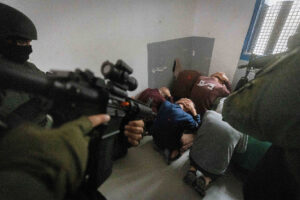At Sde Teiman, Khaled Mahajneh found a detained journalist unrecognizable as he described the facility’s violent and inhumane conditions.

Palestinian prisoners from Gaza seen at a courtyard in a prison in southern Israel, February 14, 2024. (Chaim Goldberg/Flash90)
Baker Zoubi reports in +972 June 27, 2024
“The situation there is more horrific than anything we’ve heard about Abu Ghraib and Guantanamo.” This is how Khaled Mahajneh describes the Sde Teiman detention center as the first lawyer to visit the facility. More than 4,000 Palestinians whom Israel arrested in Gaza have been held at the military base in the Naqab/Negev since October 7; some of them have subsequently been released, but most remain in Israeli detention.
Mahajneh, a Palestinian citizen of Israel, was initially approached by Al Araby TV, which was seeking information about Muhammad Arab, a reporter for the network who was arrested in March while covering the Israeli siege of Al-Shifa Hospital in Gaza City. “I contacted the Israeli army’s control center, and after providing them with a photo and an ID card of the detainee, as well as my official power of attorney document, I was informed that [Arab] was being held at Sde Teiman and that he could be visited.”
When Mahajneh arrived at the base on June 19, he was required to leave his car far away from the site, where an army jeep was waiting to transport him inside. This was “something I had never encountered on any previous visit to any prison,” he told +972. They drove for about 10 minutes through the facility — a sprawling network of trailers — before arriving at a large warehouse, which contained a trailer guarded by masked soldiers.
“They repeated that the visit would be limited to 45 minutes, and any action that may harm the security of the state, the camp, or the soldiers will lead to the immediate cessation of the visit. I still don’t understand what they meant,” Mahajneh said.
Soldiers dragged out the detained journalist with his arms and legs tied, while Mahajneh remained behind a barrier. After soldiers removed his blindfold, Arab rubbed his eyes for five minutes, unaccustomed to the bright light. “Where am I?” was the first question he asked Mahajneh. Most Palestinians at Sde Teiman do not even know where they are being held; with at least 35 detainees having died in unknown circumstances since the war began, many simply call it “the death camp.”
“I have been visiting political and security detainees and prisoners in Israeli jails for years, including since October 7,” Mahajneh noted. “I know that the conditions of detention have become much harsher, and that the prisoners are abused on a daily basis. But Sde Teiman was unlike anything I’ve seen or heard before.”
More …

